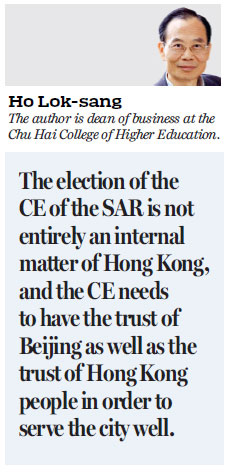Basic Law interpretations serve HK's best interests
Updated: 2017-06-06 07:23
By Ho Lok-sang(HK Edition)
|
|||||||
Despite the outcry every time the NPCSC rules on issues, Ho Lok-sang says this has always been beneficial to the city
Throughout the past 20 years of the Hong Kong Special Administrative Region's short history, every time the National People's Congress Standing Committee (NPCSC) interprets the Basic Law there was a public outcry. Andrew Li Kwok-nang, past chief justice of the Court of Final Appeal, while agreeing that the NPCSC has the right to interpret the Basic Law, questioned the wisdom of the NPCSC stepping in ahead of the court's ruling on the Sixtus Leung and Yau Wai-ching swearing-in case. In an interview, he said this undermined the public's perception of the independence of Hong Kong's courts.
It is important to note that the NPCSC certainly had no reason to undermine the courts' independence or to hurt Hong Kong's interest. Li is entirely right that there should have been no need for the NPCSC to step in if common sense and fairness prevailed. Certainly when a person takes an oath to assume office as a legislator, the swearing-in should be done solemnly and respectfully. Someone who fails to do that, according to the Oaths and Declarations Ordinance, shall (a) if he has already entered his office, vacate it, and (b) if he has not entered on his office, be disqualified from entering it. Since the requirement of the law is so clear, one would have thought the NPCSC should just let Hong Kong's courts act according to the law. But it turned out that the NPCSC's interpretation was entirely necessary. There were views, even from senior counsels, to the effect that regardless of how the oaths were taken, Leung and Yau should still be admitted as legislators. If the court should rule in favor of Leung and Yau, Hong Kong would become the laughing stock of the world, and the rule of law would have been eroded.

Thus, the NPCSC was serving Hong Kong's best interest by merely upholding the law as it is stated in the ordinances. However, again from the legal profession (Professor Cora Chan, University of Hong Kong), there was the view that "in line with Leninist legal tradition, the law is viewed by the Chinese government as a mere tool to facilitate the Party agenda." (South China Morning Post, Nov 6, 2016)
Let us look at each NPCSC interpretation not requested by the SAR's courts in turn. The first, in 1999, had to do with the right of abode, when Hong Kong had to face the possibility of a deluge of immigrants in the form of mainland-born children of Hong Kong permanent residents after the Court of Final Appeal ruled in the Ng Ka-ling and Chan Kam-nga cases that all children born of permanent residents, no matter when they were born, had the right of abode in Hong Kong. The NPCSC interpretation set out to relieve Hong Kong of the prospect of having an extra 1.6 million mainland residents immigrate to Hong Kong over the course of 10 years. What has the Party agenda to do with this NPCSC interpretation?
The second NPCSC interpretation had to do with the Chief Executive election.
Article 45 of the Basic Law provides that: "The method for selecting the Chief Executive shall be specified in the light of the actual situation in the HKSAR and in accordance with the principle of gradual and orderly progress. The ultimate aim is the selection of the chief executive by universal suffrage upon nomination by a broadly representative nominating committee in accordance with democratic procedures." In 2004, the NPCSC issued an interpretation of the two annexes to the Basic Law that relate to the CE election. The interpretation added two new rules to the process, saying the CE must first report to the NPCSC about any amendment to the method of election, and the NPCSC can decide whether it is necessary.
This interpretation once again aroused protests. But is it not true that Beijing, which has sovereignty over Hong Kong, should take the CE as one of its key officers? The election of the CE of the SAR is not entirely an internal matter of Hong Kong, and the CE needs to have the trust of Beijing as well as the trust of Hong Kong people in order to serve the city well. More importantly, the interpretation contradicted neither the substance nor the spirit of Article 45.
Then there was the interpretation in 2005 to decide whether the CE who filled the post vacated by Tung Chee-hwa should serve a full term of five years or only the balance of the term left by Tung. This interpretation was necessary because there was no precedent and no one knew the answer. The nature of the interpretation was entirely technical and should not arouse any controversy.
The last interpretation was the Leung-Yau case, which I have already discussed above. I am surprised that some members of the legal profession were willing to compromise the rule of law to further their political agenda. After reading their arguments, I was glad that the NPCSC had stepped in before the courts made their rulings.
(HK Edition 06/06/2017 page8)